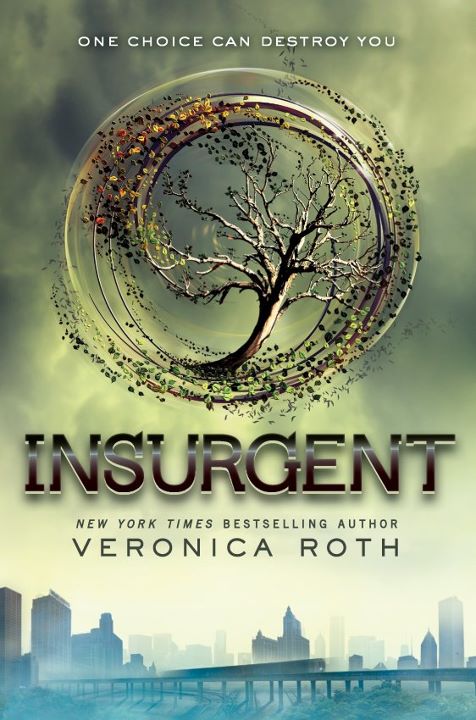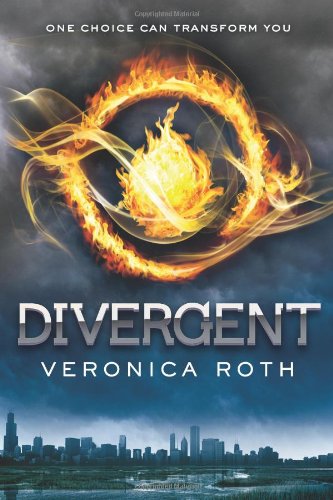
Ana's Rating
Readers Rating
(Warning: this review will contain spoilers for Divergent)
One choice can transform you—or it can destroy you. But every choice has consequences, and as unrest surges in the factions all around her, Tris Prior must continue trying to save those she loves—and herself—while grappling with haunting questions of grief and forgiveness, identity and loyalty, politics and love.
Tris’s initiation day should have been marked by celebration and victory with her chosen faction; instead, the day ended with unspeakable horrors. War now looms as conflict between the factions and their ideologies grows. And in times of war, sides must be chosen, secrets will emerge, and choices will become even more irrevocable—and even more powerful. Transformed by her own decisions but also by haunting grief and guilt, radical new discoveries, and shifting relationships, Tris must fully embrace her Divergence, even if she does not know what she may lose by doing so.
New York Times bestselling author Veronica Roth’s much-anticipated second book of the dystopian Divergent series is another intoxicating thrill ride of a story, rich with hallmark twists, heartbreaks, romance, and powerful insights about human nature.
And you thought Divergent‘s ending was mysterious.
Insurgent kick-starts right where Divergent left off, giving readers a tour of a faction-based society in the midst of war. And that isn’t pretty. The peaceful become hurtfully un-involved; the honest become selfish in the name of sacrifice; the brave become divided into cowards; the intelligent become unable to tie up the loose ends of their knowledge; the selfless become few and far between. And the Divergent become hunted.
Tris’s character can be summed up in 3 words: she needs rehab. Intensive, intensive rehab. In Divergent she may have been a tough little cookie, but here in the face of war, she is made up of guilt and grief. She struggles to remain sane and stable in the aftermath of her parents’ deaths and the death of a friend by her pull of the trigger. Paranoia plays a dominant role in her character, and self-reflection has become a hobby. This, however, is not necessarily a good thing. Too much self-reflection involves self-pity, and Tris had every right to be depressed and angst-ridden– but she has no right to take those emotions and make stupid (in a badass-type way) decisions based on them (page 301 of the hardcover. Stupid, stupid, stupid. Stupid!) . And all of this while annoying the crap out of the people who are in her head? No. Just no.
Tobias (pronounced tuh-BYE-us. Who knew, right?) remains the strong figure he was in Divergent (although he has more mood swings). He still supports and loves Tris. However, this love can come off as irritating. When Tris becomes reckless and begins to risk her life needlessly, Tobias evolves into somewhat of a jerk (while saving her life numerous times). This is completely understandable… but completely unneeded. Also, we discover that Tobias is ugly. Apparently, his ears stick out, his nose hooks at the end, and his eyes are extremely deep-set. Look Ms. Roth, when teenagers imagine book characters, they take great pleasure in imagining them as hot and sexy. Insistence on ugly descriptions isn’t really doing your readers any favours.
As a rule, I never like the second book in a trilogy as much as the first. Book 2’s always always involve complications in the relationships formed in Book 1. Unfortunately Insurgent is no exception to this rule. The fighting between Tris and Tobias is, of course, necessary and genuine. Tris evolves so much as a person that there is no way that some of her new values couldn’t conflict with Tobias’. However, this is not to say that I enjoyed their disputes. Sometimes, they fought so much and for such stupid reasons that I just wanted to shove them together and say “Now, kiss.”
Whereas Divergent lead readers into the depths of Abnegation and Dauntless, Insurgent displayed the intricacies of all five (or should I say six?) factions. We are introduced to the remaining contingents (Amity, Candor, and Erudite) as well as their leaders, and therefore into a much more complex world. These factions aren’t wholly bad or wholly good, but rather one heap of gray. Even the uncorrupt become volatile in the face of war. Interaction with the different factions left Tris with the dawn of understanding them, and therefore some life lessons and seriously reflective one-liners.
Cruelty does not make a person dishonest, the same way bravery does not make a person kind.
The Candor sing the praises of the truth, but they never tell you how much it costs.
It reminds me why I chose Dauntless in the first place: not because they are perfect, but because they are alive. Because they are free.
Deep, right?
Well, Tris’ observations aren’t the only things that are deep; the ending of this book is. Sure, Divergent‘s ending involved war between factions. And that was intense and adrenaline-pumping. But Insurgent‘s ending involves more than the five factions, more than Chicago, more than the confines of the fence. Yes, you heard me: we discover what’s on the other side of the fence, beyond the Amity farms. That is one plot twist that I did not see coming. Dang. I am still not over it.
There is, however, one thing that I would change about this ending, and that’s a name. The woman who speaks in the video? Her name should not have been what it was. It may have given Tris confidence, it may have been symbolic of Tris’ inner purity, it may have represented the meaning of her life– I don’t care. I didn’t appreciate it all. I was certainly not expecting Veronica Roth to get all chosen-one and destiny’s-course on me, because it completely defeats the purpose of Tris; what’s the point of having a character rise to strength and courage out of the sheer force of their will if they were predestined to be there in the first place? There is no point. That character’s journey becomes meaningless. Maybe I’m reading too much into that one name, but I feel terribly strongly about it.
Furthermore, I almost felt like this book should have been divided into 3 parts. The plot, though action-packed, was confusing at times, and the division might have given all the plot twists some solid ground. This is not to say that Insurgent‘s plot was too befuddling to follow. It wasn’t. In fact, it was so intense and addictive that I could not put it down. Literally. Like, staying-up-until-1:AM reading-this-book couldn’t put it down. The political intrigue was just too much for my undisciplined ability to put down an amazing book.
Because I really do feel that Insurgent was amazing. I know that I’ve been picking on it, but that’s a result of the sheer awesomeness of Divergent. Also, I really feel that Veronica Roth would appreciate my honesty.
So, to recap: Tris is a badass (she just whines sometimes). Tobias is a badass (he’s just a jerk sometimes). And Insurgent is badass beyond belief (no buts involved.) 4.9/5 stars.
I’ll keep you posted,

Ana's Rating
Readers Rating
In Beatrice Prior’s dystopian Chicago, society is divided into five factions, each dedicated to the cultivation of a particular virtue—Candor (the honest), Abnegation (the selfless), Dauntless (the brave), Amity (the peaceful), and Erudite (the intelligent). On an appointed day of every year, all sixteen-year-olds must select the faction to which they will devote the rest of their lives. For Beatrice, the decision is between staying with her family and being who she really is—she can’t have both. So she makes a choice that surprises everyone, including herself.
During the highly competitive initiation that follows, Beatrice renames herself Tris and struggles to determine who her friends really are—and where, exactly, a romance with a sometimes fascinating, sometimes infuriating boy fits into the life she’s chosen. But Tris also has a secret, one she’s kept hidden from everyone because she’s been warned it can mean death. And as she discovers a growing conflict that threatens to unravel her seemingly perfect society, she also learns that her secret might help her save those she loves… or it might destroy her.
Divergent is based on an idea that society can be divided into 5 groups whose goals are to ‘eradicate those qualities they believed responsible for the world’s disarray.’ There’s Candor, the honest; Amity, the peaceful; Abnegation, the selfless; Erudite, the intelligent; and Dauntless, the brave.
And then there’s the Divergent. The complicated.
In this world, children become adults at sixteen, when they are forced to choose whom they are going to become– forever. But–wait– you thought that sounded difficult? Really? Try mixing in political intrigue, clashes between factions, corrupt authority, threats of an uprising, cute older guys, paintball in the dark, and a battle between selflessness and courage– between selfishness and cowardice. Mmhmm. Told you it got better.
Never before has a book forced me to ask so many questions; “What if–? How does that–? What would I–? But she said that–? How do they survive for so–? Tori–? Marcus–? Four–? How do you even pronounce Eru–??”
Yep. Divergent is one of those controversial books.
I was shocked to find so many reviewers dissing Roth’s world building. They all seem to agree on the fact that a society ruled by five, and only five, particular traits is repellent, insane, and unlikely. The only thing that I have to say to this perspective is, well… yeah. Duh. It’s dystopia, people! Dystopia. And since when does dystopia entail utopia? Since when is any oppresive dystopia agreeable, or even plausible, to readers in this day and age, at all? Oh, yeah. Right. It isn’t. So the whole psycho-analysis of Roth’s factions and government and all that shiraz is really getting on my nerves.
Actually, I found the world building in Divergent to be pretty freaking amazing. I love the idea that our world could be divided (for the most part) into five different groups of people. Call me young, but I’ve never read anything like that before. I love the concept that a faction could be corrupt– but still stand for something. I love that prejudices based on colour and religion and caste are replaced by prejudices based on faction. I love the whimsical ferris wheels and the adrenaline-pumping zip lining and the thrill of jumping off of moving trains and the abhorrent mention of muffins.
Sure, Divergent left me with more questions left unanswered than explained (Did Chicago pull a Wither and simply decide to bomb the rest of the world?), but I feel as though the explanations that were provided almost made up for that.
Roth’s characters are very realistic. I loved every last one of them (Okay, that’s not true. I loved most of them.) I thought that Tris was a down-to-earth, kick-ass heroine. My favourite parts of Divergent consisted of her trying to prove herself to other Dauntless members/initiates and defending others. I was also enamored with the way she put things so simply. It was so… bold.
That is death– shifting from “is” to “was”.
~Tris
I equally enjoyed Will, Christina and Four as characters. Will was really cute, Christina was just entertaining, and Four was, well… brooding and mysterious and a man of very few words, but it was great to see an actual smart guy take the stage as male lead.
Tris and Four’s relationship was complicated. I loved that they pushed each to their limit and reminded each other of their strengths, but at some points, the ‘hot older guy’ thing was weird. However, I appreciated that Veronica didn’t incorporate a love triangle into Divergent. There’s already enough ruckus what with selflessness versus bravery, Erudite versus Abnegation, Peter versus everyone, Eric versus Four and Tris versus herself; no need to add a Four versus John-Mark.
In my opinion, Divergent has only one real downfall– and that’s the ending. Don’t get me wrong, it was just as action-packed and past-paced as the rest of the book, but it had a couple of issues. First of all, the onset was too fast. Reading it was like ‘Lalalalala, I’m so happy, yay me, let’s eat cake– oh wait we’re all gonna die!‘
Because they did die. So many of the characters just–poof–disappeared. Now, this is nerve-wracking, but understandable. Sometimes authors just have to kill off a bunch of characters for no apparent reason. What really got to me was Tris’s emotionless behavior towards these deaths. You’re reading the book, and suddenly someone’s killed, and you’re mentally breaking down because it was one of your favourite characters, but Tris just shrugs and moves on, because she’s strong. I find this quite hilarious, actually. Look, Tris, emotional strength is important– but sometimes admitting your vulnerability/weakness is strength. Breaking down or showing emotion isn’t always cowardice. Tris, obviously, hasn’t realized this yet.
I’m rating Divergent 5 stars despite its ungraceful ending. Why? Because, if you let it, this book will change your life. Its philosophy is quite powerful. And who wouldn’t want to read a book involving a faction whose favourite food is muffins?
We believe in ordinary acts of bravery, in the courage that drives one person to stand up for another.
~the Dauntless manifesto
I’ll keep you posted,


![[Twitter]](http://www.whatyareading.com/wp-content/plugins/bookmarkify/twitter.png)
